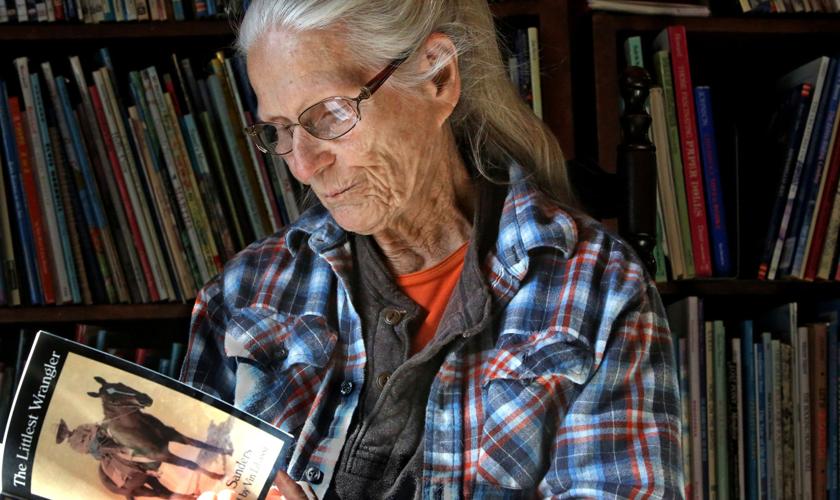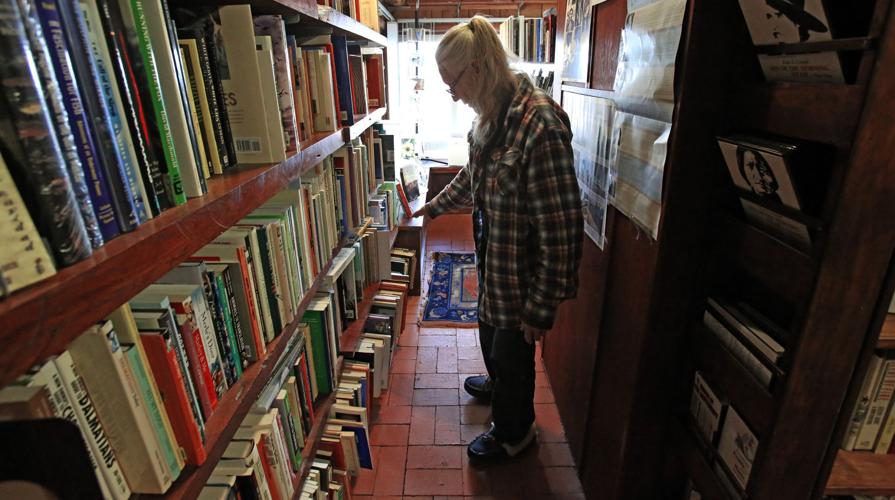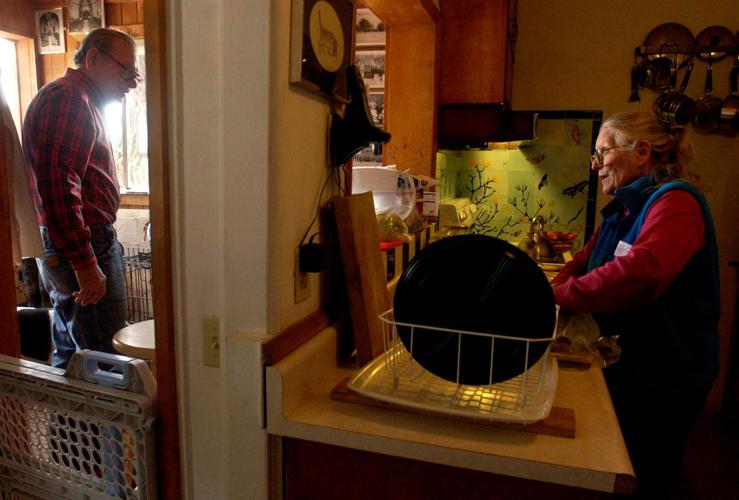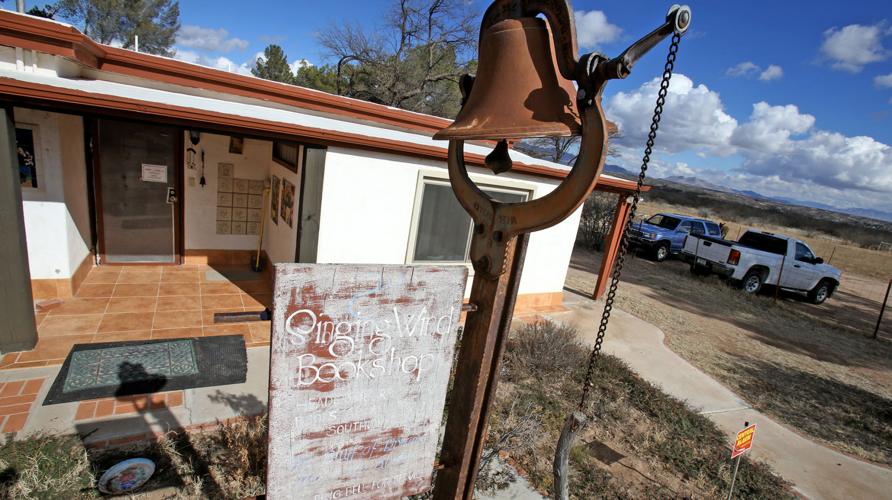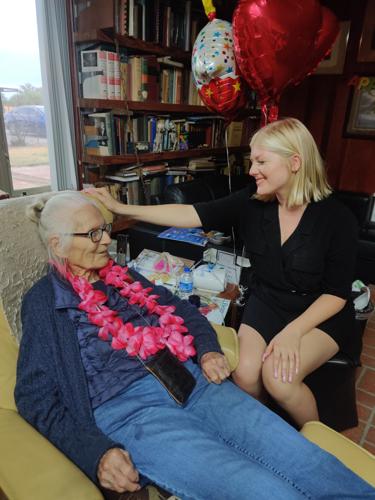Winn Bundy didn’t just run a Benson bookstore with a global customer base — she was a force of nature, say author Ken Lamberton and editor Bruce Dinges.
Bundy and her store were Arizona institutions, “like the Grand Canyon and the San Pedro River,” says Bill Broyles, a longtime Southwestern author.
Her 46 years of running Singing Wind, believed by many to be one of the Southwest’s best bookstores, came to an end last month when Bundy died of cancer at age 90.
Bundy doubled as a rancher and bookseller, hawking titles well-known and obscure with the same forcefulness she used to market grass-fed beef produced from her Charolais cattle.
Her store, anchored to a dirt road more than two miles north of Interstate 10, drew readers who loved the fact that they’d never know what they’d find on the handmade mesquite bookshelves that occupied her home’s south wing.
“She was a beacon. The literary center of the universe is supposed to be in New York, but here was this shining light of the literary world living and working on a ranch outside Benson, Arizona,” said best-selling mystery writer J.A. Jance. “She swam against the current her whole life.
“Having the nerve to own a bookstore in the middle of the desert, that’s a beacon of hope,” Jance said. “That’s somebody who says, ‘I don’t care if everybody says it’s impossible. That’s what I’m going to do and I’m going to do it here in the middle of the desert.’”
Bundy’s hospitality was as legendary as her literary offerings. She routinely offered homemade brownies and other baked goods to customers whom she didn’t know and served lunch and dinner to those she did.
Her annual Thanksgiving fiesta gatherings drew well over 100 people, who came to hear live country music and up to a dozen authors give readings. Their cars had to be parked valet-style to avoid overloading her tiny parking lot.
“She was a woman of strong opinions, and she was stubborn as the Cochise County mule,” recalled Tucson-born-and-bred nonfiction author Tom Zoellner. “But she had a singular vision, creating, as her wrought iron sign said out front, an oasis for Southwestern literature.
“She created an experience of discovering, purchasing and reading a book about the Southwest that is totally unique.”
Raised in a Frank Lloyd Wright home
Bundy was born Winifred Jean Sullivan in Oak Park, Illinois, on July 22, 1930.
More than a half-century later, she told then-Tucson Citizen reporter Charles Bowden that her home sat next to one occupied by Ernest Hemingway’s family — and that her mother told her she got tired of hearing Hemingway talk about his wartime experiences.
Her family raised her and a brother, William Sullivan, in a house designed by Frank Lloyd Wright, whose architectural work was centered in Oak Park, lying west of Chicago.
Because of her upbringing in that beautiful house, Bundy loved architecture, said her daughter, Sharon “Cookie” Bundy. Her store’s shelves were packed with books on the subject.
Bundy’s father was at various times a salesman for Purina, the dog and cat food maker, and a Buick dealer, and he moved the family all over the Midwest. In the late 1980s, Bundy told a Time magazine writer that she had attended 22 schools before reaching the 12th grade.
They eventually settled in Minneapolis, where Winn married her first husband, Bob Bundy, an electrical engineer, in 1949.
Soon afterward, he got a job at Hughes Aircraft in Los Angeles, and by the early 1950s, they had moved to Tucson around the time that Hughes, now Raytheon Missile Systems, opened a manufacturing plant here.
Settling first in the Pueblo Gardens Neighborhood on Tucson’s south side, they bought what Bundy later named the Singing Wind Ranch along the San Pedro River in 1956.
The wind sings through the mesquites
“My dad was raised on a farm and always wanted to live on a ranch,” Cookie Bundy said. “They settled on this spot because it was so beautiful here, for one thing. Also, he was working at Hughes, and he could drive to work in the morning going west where he wouldn’t face the sun and drive home going east where he wouldn’t have to be facing the sun.”
As Winn Bundy described the ranch to Bowden 25 years later, the place was almost falling down at the time they bought it. “Coupon clippers” from back East had owned the ranch, and they sold it to the Bundys when their stock dividends started to slip, she said.
The pastures were all polo fields at the time, and Cookie Bundy can still remember bounding on horses and knocking the polo balls around in the days before her parents started raising cattle there.
Her mother named it after the wind that sings through the mesquite trees, Cookie Bundy said. The ranch offers sweeping views of the San Pedro Valley and sunrises, moonrises and sunsets over surrounding mountain ranges. From there you can even see snow on the distant Huachuca Mountains, she said. Birdlife is abundant, as are coyotes, raccoons, javelinas and skunks. Once, Winn Bundy swore she saw a bear on a neighboring telephone pole.
At one time, the ranch contained more than 600 acres, and it ran down to and across the San Pedro River, then and now a stream lined by mesquite bosques. Today, the family owns a little less than 500 acres.
Venture launched with dog-sitting proceeds
Bundy had earned a bachelor’s degree in history from the University of Arizona in 1956. But the family was just running cattle on the ranch until Winn got master’s degrees from UA in the early 1970s in history and library science.
There, she came under the tutelage of Lawrence Clark Powell, author, critic and librarian, who was architect of UCLA’s library system and built the UA’s library into a respected research center.
He infused Bundy with her love of books, she later told interviewers, although Powell at first tried to discourage her from starting a bookstore, saying it would never work in such a remote location.
“She saw the bookstore as the extension of (Powell’s) mission, to celebrate the literature of this unique place in the country,” Zoellner recalled.
Bundy and her husband bought the store’s first books with $600 they got from a family for whom they were dog-sitting for two “horrid” German shepherds, as Time described them. It seems the dogs were tormenting the Bundys’ horses, and one of the horses kicked a dog in the face and knocked its eye out, damage for which the Bundys charged the dog owners.
“Always real close to the edge”
The store grew by word of mouth. Winn Bundy did little or no advertising. Family members and friends said it made little or no profit, although she was usually able to earn enough to pay at least one staffer, sometimes more.
“You’re always real close to the edge,” Bundy told the Arizona Daily Star in 2015. “You don’t make a lot of money in books. ... It’s mostly the people that make it worth it.
“Readers are fascinating. You find out what they like and then you try to get the right book to the right person. That’s my goal.”
For decades, the store carried more than 10,000 books, with thousands more stuffed in nooks and crannies around the rest of the house.
Besides books of Southwestern history and literature, she sold lots of books on music, art, architecture, regional and national politics, culture, religion, mysteries, women’s writings, mythology, religion and sports.
“She would try to keep the well-read tomes and the grift in Southwest history in stock until they went out of print,” said Kathy Suagee, who worked at the shop for 27 years until 2014 as a clerk, a store manager and a payroll manager at various times.
Unlike many chain bookstores, Bundy marketed books she thought worthy, not because they were bestsellers, Suagee said. “I can’t remember stocking very many titles because we thought they would sell.”
For most of the store’s existence, Bundy refused to take credit or debit cards because she didn’t like the extra paperwork, she told several interviewers. She also refused to sell books online.
“She was just resistant to change at all, very old fashioned in many ways, business-wise at least,” recalled Tasha Bundy, her granddaughter. “It wasn’t something she could grasp. It didn’t seem feasible to her. If she had, the store would absolutely have made more money.”
Known around the world
The store’s unique selection and location gave it worldwide popularity. Besides the Arizona press, Singing Wind was written up in the Wall Street Journal, Time, the Los Angeles Times, the Boston Globe and National Geographic Traveler, among other publications.
Bundy also was a strong advocate for writers in this region, various authors said.
One of her early efforts was to help Bowden, who died six years ago, publish his first book, the groundbreaking “Killing the Hidden Waters.” It warned, more than 40 years ago, of the environmental perils of untrammeled groundwater pumping.
Bowden had written his manuscript under contract for the UA’s Office of Arid Lands Studies, which declined to publish it. While doing research for an arid lands course at the university in the 1970s, Bundy read it and, finding it “provocatively and brilliantly written,” took it to her mentor Powell, Bundy wrote in the book “America’s Most Alarming Writer,” a 2019 collection of essays about Bowden.
Powell took it to the University of Texas Press, which published it and has kept it in print ever since.
At her annual fiestas featuring readings by authors, “she would do her little introduction to each other and then say, ‘You need to buy their books,’” said Ken Lamberton, a Bisbee author who read at several of these events.
“People would go out with paper sacks full of books. She was not twisting your arm, but it was pretty close.
“She put Benson on the map. The people I talked to who were not living here, they’d never heard of Benson, but they’d heard of the bookstore,” he added.
You see a lot of book people who sold books, but Bundy was the kind who sold the authors, said Bruce Dinges, co-editor of the Bowden essay collection, and the Arizona Historical Society’s retired director of publications.
“A lot of people saw books as books. She saw them as packages of ideas,” Dinges said.
Her collection and knowledge of books of Arizona and the Southwest were monumental, author Jance said. “You could ask her for a rare book and she knew the book and where to get it.
“She was clearly a rancher; but in your mind’s eye, you don’t equate ranchers with people running bookstores,” Jance said. “She was definitely a cowgirl but a very literate cowgirl. She may have been country but she was anything but a country hick.”
And unlike many booksellers, she kept unsold books and never returned them to publishers, said longtime Tucson author Tom Miller.
His 1981 book “On the Border” sold for $12.95 when first published, but while other stores later sold copies at higher prices, she kept the book in stock for a number of years and kept the price low.
“It was very satisfying to run into somebody like that who was so aware. You got the feeling she had read every book in there, she was so familiar with everything,” Miller said.
Her first husband, Bob Bundy, died in 1983. Her second husband, Joe Smeltz, died in 2013. Besides Cookie Bundy, she is survived by a son, Tad, of Phoenix, six grandchildren and a great-granddaughter.
Uncertain future for the shop, “her dream”
It’s unclear if her store will survive her.
In March, she was forced to close it, temporarily it seemed at the time, because of COVID-19. The pandemic is also why no memorial gathering for Bundy is planned at this time.
Today, Bundy’s daughter Cookie said it’s too early to decide if the store will reopen.
“We have a lot of talking to do,” she said. “It’s a lot to lose her. She was such a huge presence. It’s kind of surreal that she’s no longer around. The store was her dream.”
Winn’s granddaughter Tasha Bundy said she wants to honor her grandmother’s legacy by keeping the store alive.
“We have to be down there anyway right now, and we have to generate a little income while doing it,” she said. “Maybe it will be successful, maybe it won’t be.”


